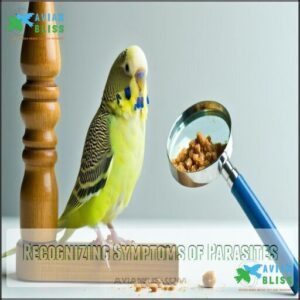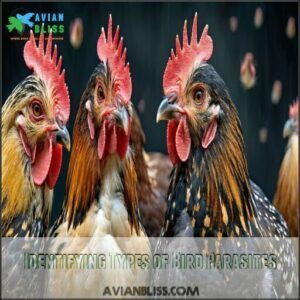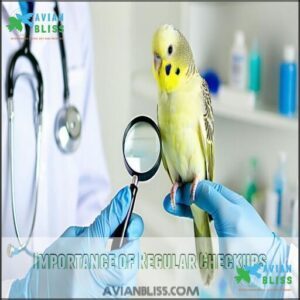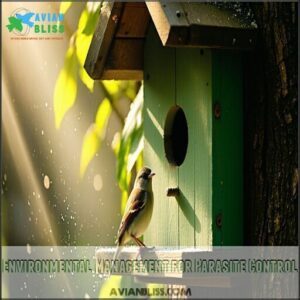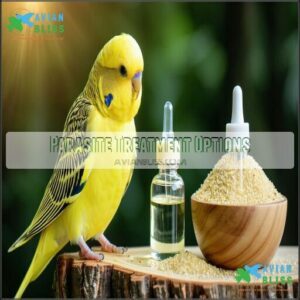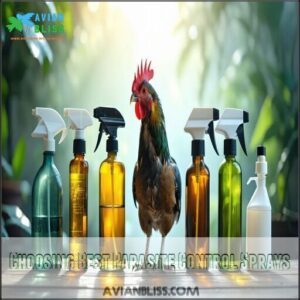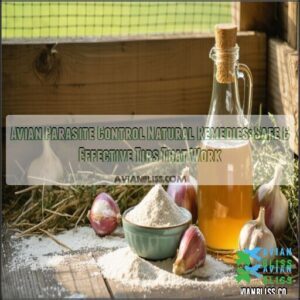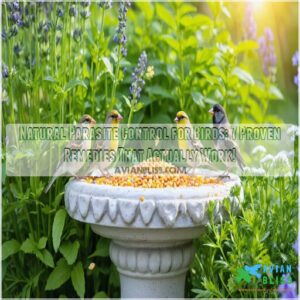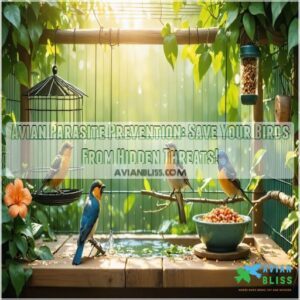This site is supported by our readers. We may earn a commission, at no cost to you, if you purchase through links.

Watch for signs of infestation, like feather loss or unusual behavior, and consult a vet about safe treatments, such as dewormers or insecticides.
Boost your birds’ immunity with a balanced diet, including seeds, fruits, and veggies. Natural remedies, like diatomaceous earth or pumpkin seeds, can also help.
Parasites are persistent, but with consistent care and monitoring, you can keep them at bay—and your birds will thank you with vibrant health.
Table Of Contents
- Key Takeaways
- Bird Parasite Detection
- Preventing Parasite Infections
- Parasite Treatment Options
- Effective Parasite Control Methods
- Choosing Best Parasite Control Sprays
- Frequently Asked Questions (FAQs)
- How do I know if my bird has a parasite?
- What is the medicine for parasites in birds?
- How do you prevent parasitic feather mites in birds?
- How can parasites impact bird breeding success?
- What are seasonal risks for bird parasites?
- Can parasites spread between different bird species?
- What role does climate play in parasite infestation?
- How to manage parasites in outdoor aviaries?
- Conclusion
Key Takeaways
- Keep your birds healthy by cleaning cages daily, disinfecting perches, and providing a stress-free environment.
- Watch for signs like feather loss, itching, weight changes, or unusual droppings as early indicators of parasite infestations.
- Use vet-approved medications or safe natural remedies like diatomaceous earth to treat and prevent parasite infestations.
- Quarantine new birds and schedule regular checkups to stop diseases from spreading and ensure long-term health.
Bird Parasite Detection
You can spot parasites in your birds by keeping an eye on changes like feather loss, itching, or odd behavior.
Keep your bird healthy by watching for feather loss, itching, or unusual behavior—early signs of parasite trouble.
Early detection guarantees your birds stay healthy and avoids bigger problems down the road, which is a complete concept to consider for their well-being.
Recognizing Symptoms of Parasites
Spotting bird parasite symptoms isn’t hard if you know what to watch for.
Feather abnormalities, weight loss, or even subtle bird parasite behavior changes can hint at trouble.
Skin irritation and odd droppings often raise red flags too.
Dropping analysis is a go-to method for checking health.
Act fast—regular observation keeps your bird safe and thriving.
Identifying Types of Bird Parasites
It’s essential to master bird parasite identification to keep your feathered friends safe.
Know these common threats:
- External parasites like mites cause feather damage and itchiness.
- Internal parasites such as worms disrupt digestion.
- Protozoan parasites harm important organs.
The mite lifecycle thrives in hidden spots, requiring vigilance.
The worm lifecycle is also crucial to understand for preventative measures.
Preventative knowledge of the worm lifecycle guarantees timely action.
To further enhance your skills, consider using a bird identification app for quick assistance.
Importance of Regular Checkups
Regular checkups help spot issues before they snowball into major problems.
Early detection through health monitoring and bird inspections keeps parasites from taking hold. A proactive approach, like routine vet consultations, strengthens preventative care. Think of it as a system tune-up for your bird!
| Task | Frequency | Purpose | Tip |
|---|---|---|---|
| Vet Consultation | Every 6-12 months | Professional bird parasite checkups | Prepare questions in advance. |
| Health Monitoring | Weekly | Spot early warning signs | Keep a log of changes. |
| Cage Cleaning | Daily | Prevent contamination | Rotate cleaning supplies weekly. |
| Bird Inspections | Monthly | Detect mites or abnormalities early | Check feathers and skin closely. |
Preventing Parasite Infections
You can protect your birds from parasites by maintaining strict hygiene, providing a balanced diet, and keeping their environment clean and stress-free.
Regularly disinfect cages and feed areas, and quarantine new birds to stop infections before they start, which is crucial for maintaining a stress-free environment.
Hygiene Practices for Bird Owners
Cleanliness is key to bird parasite prevention.
Wash your hands before and after handling birds—handwashing importance can’t be overstated.
Keep clothing hygiene in check by cleaning shoes and clothes after bird contact.
Prioritize cage cleanliness, disinfect perches regularly, and swap food and water daily.
Using a safe cleaning product is important for avian health.
These bird hygiene practices guarantee environmental hygiene, reducing risks and fostering healthier feathered friends.
Balanced Diet for Strong Immune System
Keeping your bird healthy starts with a balanced diet formulated for their species.
Meeting nutrient requirements boosts immune support, strengthens the gut microbiome, and guarantees proper nutrient absorption.
A strong immune response fights parasites more effectively.
A balanced avian diet is essential for overall well-being.
Consider dietary supplements if needed, but don’t overdo it.
Remember, a healthy bird diet is your frontline defense in bird parasite prevention.
Environmental Management for Parasite Control
From protecting your birds to maintaining a parasite-free environment, effective management is key.
Here’s your checklist:
- Clean housing with bird-safe disinfectants to reduce parasites.
- Control stress by providing a calm, tidy environment.
- Wild birdproof spaces to limit external contamination.
- Regularly disinfect bath areas to guarantee safe bathing hygiene.
Use approved cleaning solutions for sanitation.
Stay consistent—prevention is easier than treatment!
Parasite Treatment Options
In the context of treating bird parasites, effective options include medications, topical treatments, and natural remedies designed for the type of parasite.
Using the right method at the right time protects your bird’s health and guarantees long-term relief.
Medications for Internal Parasites
Internal parasites in birds, such as nematode endoparasites like ascarids and Capillaria, require precise treatment.
Deworming schedules guarantee proper timing, while dosage calculation prevents resistance development.
Antiparasitic drugs like fenbendazole and pyrantel pamoate are effective when used correctly.
Consider avian deworming options for thorough parasite management.
Monitoring medication interactions is key, and adding probiotics supports recovery.
Always consult your vet to target infections safely and effectively, using proper treatment.
Topical Treatments for External Parasites
For external parasites in birds, topical treatments work wonders.
Use safe ingredients and follow proper application methods to avoid bird sensitivity.
Treat feather mites, lice, and other ectoparasites by applying sprays or ointments directly onto affected areas.
To guarantee effective mite control in poultry or bird lice treatment, adhere to recommended treatment frequency and monitor results closely.
- Use sprays with safe, proven ingredients.
- Follow label instructions for accurate application.
- Address resistance issues by rotating treatments.
- Keep up with regular treatments for long-term parasite control.
Natural Remedies for Bird Parasites
Natural parasite control can work wonders when done right.
Natural remedies are safe, effective, and promote bird health without relying on harsh chemicals.
Diatomaceous Earth, sprinkled in cages, combats pests. Garlic benefits birds by repelling parasites naturally, while pumpkin seeds help expel worms.
Herbal powders like aloe vera prevent infestations. Vinegar solutions, especially apple cider, enhance gut health.
These natural remedies are safe, effective bird parasite prevention methods, promoting health without harsh chemicals.
Effective Parasite Control Methods
You can keep your birds healthy by combining proven methods like quarantine procedures, vaccinations, and regular monitoring.
These steps work together to stop parasites from spreading and guarantee a safe, clean environment for your feathered friends, using methods that are proven.
Quarantine Procedures for New Birds
When bringing new domestic birds home, quarantine is non-negotiable.
Set up a separate cage away from others, incorporating stress reduction techniques and proper ventilation.
Follow an observation protocol during the isolation duration, checking for signs of illness or parasites.
Gradual introduction helps guarantee harmony after quarantine.
Bird isolation safeguards everyone’s health and supports long-term parasite control.
Vaccination Programs and Biosecurity
Vaccination programs and biosecurity protocols form the backbone of avian parasite prevention and disease control.
Vaccines boost immune defenses, ensuring disease prevention and protecting future generations.
Strong biosecurity protocols, like outbreak management and zoonotic prevention strategies, halt pathogens in their tracks.
Combine these measures with genetic resistance breeding programs to create healthier flocks, minimizing risks and strengthening overall avian disease prevention efforts, which rely on biosecurity protocols and disease prevention.
Regular Surveillance and Monitoring
Think of bird parasite monitoring like regular health check-ups—they’re key for early detection.
Use surveillance methods such as health checks and diagnostic testing to spot issues early.
Keep detailed records for better data analysis and take preventative measures based on trends.
Monitoring systems simplify tracking parasites, letting you adjust care swiftly to keep your birds happy and parasite-free.
Implementing proper hygiene practices can further aid in preventing outbreaks and support overall bird health through regular health check-ups.
Choosing Best Parasite Control Sprays
Choosing the right parasite control spray keeps your birds healthy and your environment pest-free. Focus on sprays that target specific parasites, are safe for birds, and easy to apply.
Key Features of Effective Sprays
When picking bird parasite sprays, focus on key features to guarantee they work effectively.
Check for active ingredients like pyrethrins or spinosad that target specific parasites. Confirm bird safety by choosing vet-approved products.
Look for sprays with long-lasting effects to minimize reapplications. Choose easy application methods for better coverage, and select options designed to prevent resistance over time.
- **Targeted active ingredients protect effectively.
- **Bird-safe formulas guarantee health and comfort.
- **Long spray duration reduces frequent treatments.
- **Simple application methods save time and stress.
Factors to Consider When Selecting Sprays
When choosing bird parasite sprays, focus on spray safety and bird parasite active compounds.
Look for sprays with a safe application method and a residual effect to guarantee long-term protection. Evaluate bird parasite spray ingredients for proven efficacy, but always prioritize bird safety.
A broad spray spectrum helps tackle various parasites, making bird parasite effective sprays a must-have.
Consider using diatomaceous earth for natural pest control.
Popular Spray Options for Bird Parasites
In the context of bird parasite treatment, using effective sprays makes a world of difference.
Here are standout options:
- Avian Insect Liquidator: Offers 3-way protection with safe application techniques.
- Pyrethrin Sprays: Targets mites and lice effectively; mind resistance issues.
- Mite Killer Spray by Premo Guard: Natural, safe, and versatile with broad-spectrum use.
Always follow spray safety precautions for your bird’s health.
Frequently Asked Questions (FAQs)
How do I know if my bird has a parasite?
You might notice weight loss, feather damage, itching, changes in droppings, respiratory issues, or lethargy.
Look for scaly skin, crusts, or mites under wings.
A vet check confirms parasites and guides treatment.
What is the medicine for parasites in birds?
It’s surprising how one small parasite can cause such big trouble!
Medicines like ivermectin, fenbendazole, and pyrantel pamoate effectively treat parasites in birds.
Always consult your avian vet for safe dosing and guidance.
How do you prevent parasitic feather mites in birds?
To prevent parasitic feather mites, clean cages and perches regularly, quarantine new birds, provide balanced diets, and use mite-repellent sprays like Avian Insect Liquidator.
Routine vet checkups guarantee early detection and effective control of parasitic issues, making them a crucial part of effective management.
How can parasites impact bird breeding success?
Parasites act like silent saboteurs, draining energy, disrupting hormones, and causing stress, which can lower fertility, weaken egg quality, and reduce hatch rates.
By managing parasites, you guarantee healthier breeding conditions and stronger chicks, which can be considered a key factor in improving overall fertility.
What are seasonal risks for bird parasites?
Spring and summer increase parasite risks due to warmer weather, higher humidity, and breeding cycles.
Watch out for mites, lice, and worms during these seasons.
Regular cleaning, quarantine, and vet checkups keep your birds safe.
Can parasites spread between different bird species?
Picture a crowded dance floor—parasites can jump between bird species like uninvited guests at a party.
They exploit shared spaces, food, and water, spreading easily.
Quarantining new birds and cleaning thoroughly helps break their chain of mischief.
This approach is crucial as it prevents the parasites from further spreading.
What role does climate play in parasite infestation?
Warm, humid climates create a perfect storm for parasite infestations, as they thrive in moist, temperate conditions.
Cooler, drier climates slow parasite reproduction, but sudden weather shifts can stress birds, weakening immunity and increasing vulnerability to parasite infestations.
How to manage parasites in outdoor aviaries?
Did you know outdoor aviaries can increase parasite infestations by 30%?
Clean perches, disinfect cages weekly, and check for wild bird contamination.
Use vet-recommended sprays or powders, and avoid overcrowding to keep your birds parasite-free.
Conclusion
Imagine discovering a simple routine that guarantees your bird’s health and happiness.
By focusing on avian parasite control in domestic birds, you can create a clean, stress-free space where parasites can’t thrive.
Regular monitoring, proper hygiene, and a nutrient-rich diet are essential tools in this fight.
Combine vet-recommended treatments with natural remedies for a balanced approach.
With diligence and care, you’ll protect your feathered friends and also enjoy their vibrant companionship for years to come.

